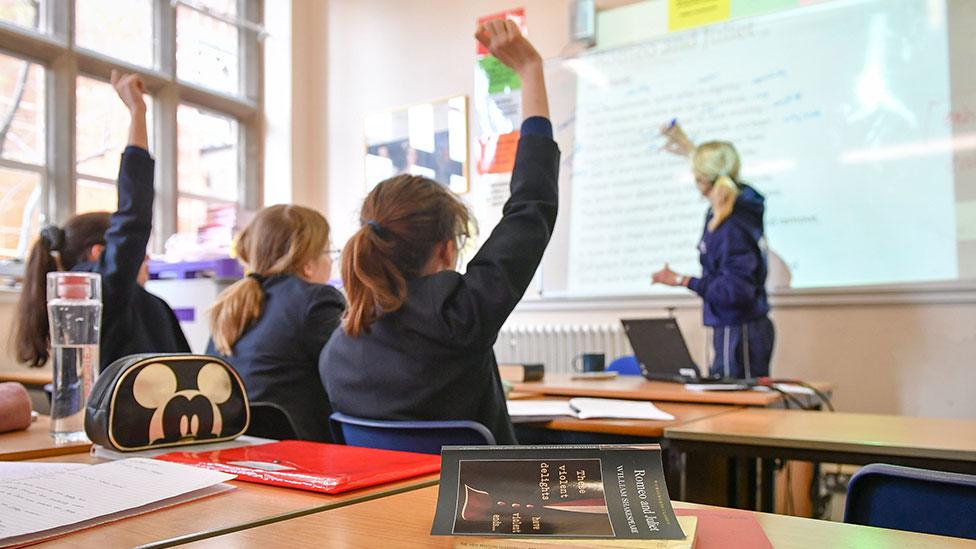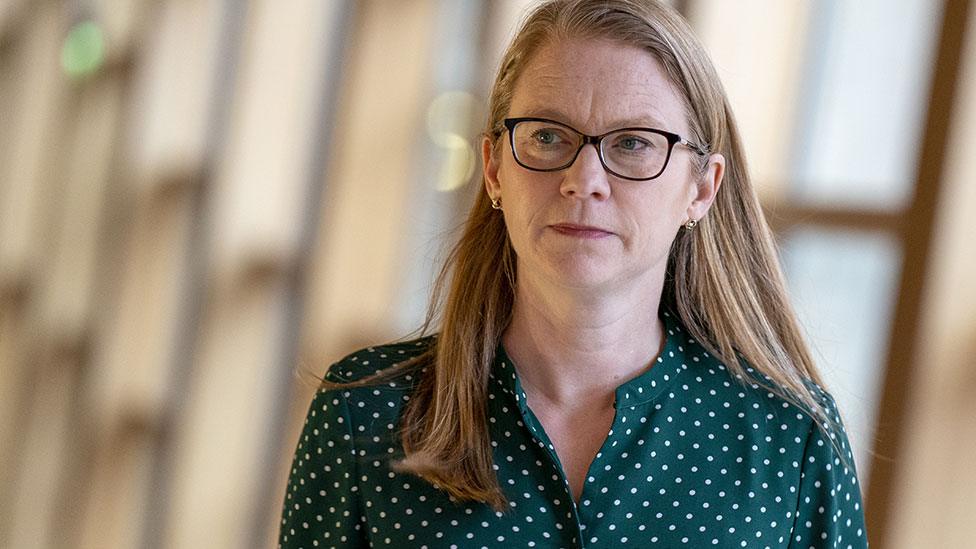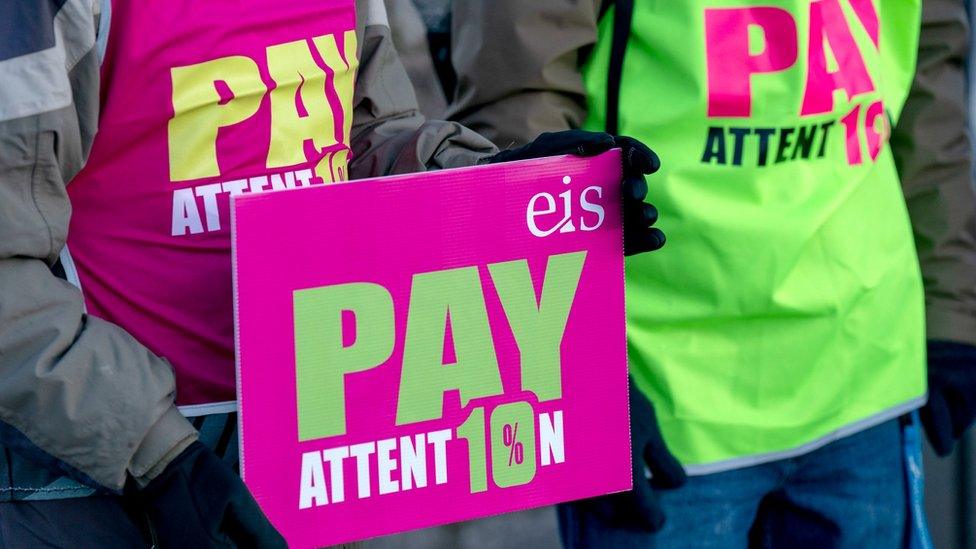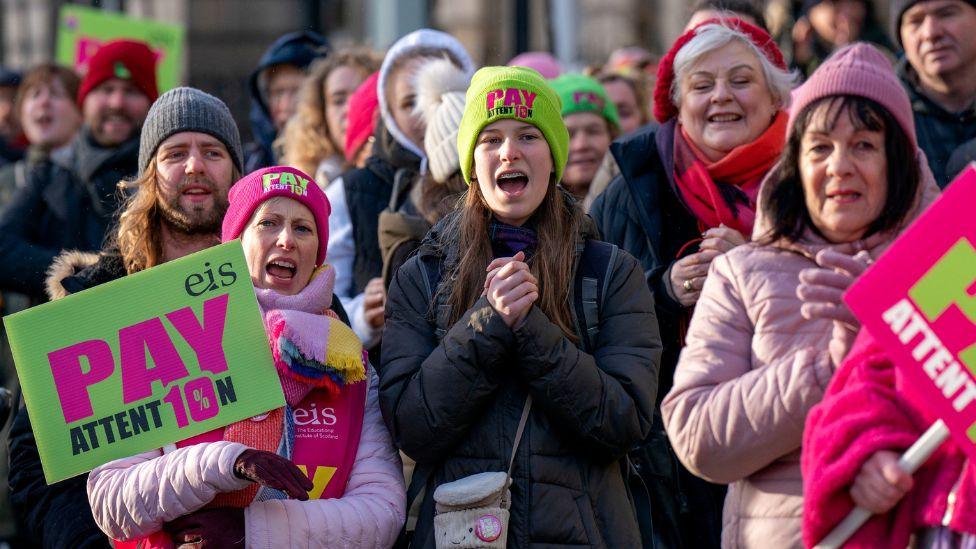Teachers will be protected from council job cuts, says Sturgeon
- Published

Several councils are understood to be considering education cuts to balance their budgets
The number of teaching posts in Scotland will be protected from council cuts, Nicola Sturgeon has confirmed.
She told Holyrood it would not be acceptable for the teaching workforce to fall and said her government would "act to protect teacher numbers".
Education secretary Shirley-Anne Somerville is also expected to announce within days a plan to prevent the number of school hours being reduced.
Council leaders expressed "extreme disappointment" with the move.
It follows reports that several local authorities, including SNP-led Glasgow city council, are considering education cuts to balance their budgets.
Last week it emerged that Glasgow was considering plans that could see 800 teachers cut and primary schools closing early on Fridays.
Some councils, including Edinburgh, East Lothian, Borders, Midlothian, West Lothian, and North Lanarkshire close schools early on a Friday afternoon, but these hours are made up across the week with longer days.
At present, Scottish councils tend to offer 25 hours of primary school teaching a week, and 27.5 hours to secondary school pupils.
At First Minister's Questions in Holyrood, Ms Sturgeon said her government had made a commitment to increase teacher numbers.
"Councils are being given additional funding specifically to deliver that, so it would not be acceptable to me, or to the Scottish government, to see teacher numbers fall," she said.
"I can confirm that the government does intend to take steps to ensure that the funding we are providing to councils to maintain increased number teachers actually delivers that outcome.
"The education secretary will set out more details to parliament in the coming days."

Shirley-Anne Somerville is expected to give more details to MSPs in the coming days
Local government body Cosla has expressed "deep concern" over this year's cash allocation from the Scottish government and warned of a significant funding gap.
A document seen by BBC Scotland, prepared by Cosla for a meeting on Friday, states that ministers are considering introducing new regulations under the Education (Scotland) Act 2016.
These would set a minimum number of learning hours each week to prevent councils cutting the school week, and lock current pupil-teacher ratios.
Financial penalties would be put in place for local authorities that do not comply with the number of pupils per teacher - which averaged 13.2 in 2022.
The document also said that council leaders were extremely disappointed that the Scottish Government was pressing ahead without prior consultation with Cosla.
Scotland's largest teaching union, the Educational Institute of Scotland (EIS), welcomed the Scottish Government's intervention, but said there was "persistent under-funding and under-resourcing" of schools.
Andrea Bradley, EIS general secretary, said: "Any cuts to teacher numbers and the pupil week are untenable, and would have a serious detrimental impact on young people's education.
"Cuts to teacher numbers pile additional workload onto already severely over-burdened teaching staff, while also having profoundly damaging consequences for pupils' learning."
Last year, the Scottish government earmarked £145m to help councils maintain and expand the teaching workforce.
Despite this, annual statistics for 2022 published in December showed that the total number of teachers fell by 92 year on year to 54,193.
Ministers have previously used ring-fencing to protect spending in particular areas. They also have statutory powers to direct education authorities in certain circumstances.
'Diktat to councils'
At Holyrood last week, Conservative leader Douglas Ross said he was "deeply worried" about the threat of teacher cuts in Glasgow and elsewhere.
When he asked the first minister how many teachers would lose their jobs across Scotland, Nicola Sturgeon did not offer a specific number.
Ms Sturgeon said she respected the "autonomy of democratically elected institutions".
Scottish Conservative's education spokesman Stephen Kerr said it was unfair of Nicola Sturgeon to "issue this diktat to councils" without offering additional funding to make it deliverable.
He said it was the "height of cynicism" for the first minister to ring-fence council spending, as it would bring "more savage cuts to the remaining services local authorities have to provide".


Some councils - including Glasgow - have been looking at the possibility of cutting teacher numbers to help balance their books.
The option has been on the list of savings produced by council officials, but no council has set its budget for the coming financial year.
There is one obvious way the Scottish government could prevent councils from reducing teacher numbers.
Councils get much of their money from the government and some of it is ring-fenced for specific purposes. The government could make some of this funding conditional on maintaining the same number of teachers.
But there could be practical issues to contend with. For instance, the number of teachers employed by a rural council may inadvertently fall slightly because of problems filling a vacancy in an isolated school.
If a school closes, teachers are redeployed to other schools within the area. They do not face the risk of compulsory redundancy.
Councils are finding it hard to balance their books. Some would argue that if savings in education cannot be contemplated, they would need to consider more cuts elsewhere.
Lurking in the background to this discussion, of course, is the ongoing teachers' strike.
This dispute is purely about pay and any moves to ensure there are no cuts in teacher numbers will not settle the dispute - even if they may be welcomed by the unions.

- Published16 January 2023

- Published18 December 2022

- Published30 January 2023
